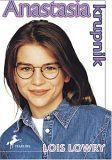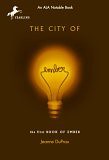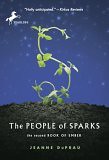Man, am I ever behind in my blogging duties. I was going to put together my Best of 2006 list, but I haven't talked about half the books on the list yet. Ah well.
None of these will be on the list, but it's what I feel like talking about right now.
Anyway... so this summer I finally read Anastasia Krupnik by Lois Lowry and The Agony of Alice by Phyllis Reynolds Naylor. Both are the first books in extremely popular series that I never read when I was the target audience, but wish I had. Interestingly enough, I liked Alice a lot more than Anastasia, but when I was a kid, it would have been the other way around.
Quick summaries:
Anastasia hates her name, her fourth grade teacher, liver, and pumpkin pie. She loves making lists, writing poetry, her wart, and her goldfish. When her parents announce she's going to have a little brother, she adds her parents and babies to the list of things she hates. Over the school year, both lists change as items are added and deleted in this funny and moving book.
Alice is about to start sixth grade at a new school in Silver Spring. ALl she really wants is to be on safety patrol, but they were all chosen the year before. Instead of being placed in Miss Cole's class (who will sometimes drive you home in her sports car) or Mr. Weber's class (who takes everyone on a camping trip in the spring), she has Mrs. Plotkin, who is boring and old. If she only had a mother, Alice would have help navigating her transition into being a teenager, but, left on her own, is she really just going backwards and not growing up at all?
I also read Starting with Alice, which is the first of 3 prequels to the Alice series.
Both Alice and Anastasia are accurate and touching portrayals of the 10-13 years, which are not fun. I think I liked Alice better now because Naylor picks up on a lot of the mishaps that I can now look back on and laugh about. Lowry picks up on those feelings that still hurt.
Also, remember that show on PBS that you got to watch in reading class where this woman would read a story or a chapter while the guy drew illustrations? Once, she read this story about a girl whose brother takes her jeans shopping and she walks in on a guy in blue underwear in the dressing rooms. I always wanted to know what the story is and wanted to read it. I remembered it the first time I ever fell into the Gap. I was very excited when I was reading The Agony of Alice and THERE IT WAS! And then I was very annoyed because she was buying Levis. At the Gap. The Gap only sells Gap brand!
Showing posts with label Lois Lowry. Show all posts
Showing posts with label Lois Lowry. Show all posts
Tuesday, December 19, 2006
Friday, July 21, 2006
Post-Apocalyptic Children's Lit
Yes, such a genre exsists. I'm totally serious.
The City of Ember By Jeanne DuPrau
Doon's outburst on job assingment day disturbed Lina-- Ember couldn't be dying. But as Lina runs around the city as a messenger, she starts to see that Doon was right. Ember is dying. The blackouts come more and more often and they're lasting for longer. Supplies are running out. Peaches are now just a legend. There is very little new paper. Colored pencils are a special, rare, luxury. What if the lights never come back on? Can Doon and Lina find another way?
City of Ember is half mystery, as the kids try and piece together lost instructions that were half eaten by Lina's baby sister. But why does Ember exsist in the first place? Why do they live in world where there is only the city and nothing else? Where there isn't any light? Where everything depends on the generator? What happens with the generator fails?
Some of these questions are answered in the sequel, The People of Sparks where we learn that the world new the end was coming--through war, famine, and disease--and created a new colony underground. When they come above ground, and meet with the survivors of the great wars, will the two cultures survive? Will they get along? Can they?
I love DuPrau's use of language. She manages to perfectly capture so many small details-- such as the papery smell of tomatoes. She can evoke so many senses with just a few words--truly astounding. Ember was great, but the message of Sparks was so heavy-handed that it ruined the book. I'm interested in seeing how the prequel, The Prophet of Yonwood, ends up being.
The Big Wave Pearl S. Buck
Kino lives on a mountain by the sea in Japan while his best friend, Jiya, lives in the fishing village on the beach. Kino fears the volcano three mountains over and Jiya fears the anger of the sea. One day, the volcano and the sea battle, resulting in a giant wave that washes away the entire fishing village—and Jiya’s entire family. The main meat of this story is how Jiya learns to live again after watching the destruction of his entire family, village, and world.
Buck manages to convey so much in a very little space. She manages to span a life-time, and a full cycle of grief very potently and truly, all in a mere 64 pages. Excellent.
And, although it's not post-apocalyptic, Lois Lowry's The Giver is as dystopian as it gets... and dystopian chidlren's literature is almost as disturbing as post-apocalyptic literature (this is a visceral reaction. I really enjoyed the books I'm talking about right now, they're great books and good for children, but at first glance, the notion of such genres of children's lit exsisting give me pause. But I'm a optimistic hippie like that.)
Anyway, Jonas has been assigned to be the Reciever. He holds the memories of the community's past. A past where people were related to their families. Where there was emotion. Where there were holidays and hills and snow and sunburn... where there was pain, but also real joy... Where there was color.
But years and years ago, the people made a shift to sameness. Now there are no hills. Husbands and wives are assigned to each other and do not look on each other's nudity. When you reach puberty, you are given medication to stop "the stirrings". Children are assigned to family units. Each one has one boy and one girl. Because of genetic engineering, people look a lot a like. But it is not all happy. Anything that isn't perfect--babies that cry too much, old people, are "released".
And once Jonas discovers that releasing is just an euphanism for euthanasia... his vision of the community and what it stands for falls apart.
Powerful.
The City of Ember By Jeanne DuPrau
Doon's outburst on job assingment day disturbed Lina-- Ember couldn't be dying. But as Lina runs around the city as a messenger, she starts to see that Doon was right. Ember is dying. The blackouts come more and more often and they're lasting for longer. Supplies are running out. Peaches are now just a legend. There is very little new paper. Colored pencils are a special, rare, luxury. What if the lights never come back on? Can Doon and Lina find another way?
City of Ember is half mystery, as the kids try and piece together lost instructions that were half eaten by Lina's baby sister. But why does Ember exsist in the first place? Why do they live in world where there is only the city and nothing else? Where there isn't any light? Where everything depends on the generator? What happens with the generator fails?
Some of these questions are answered in the sequel, The People of Sparks where we learn that the world new the end was coming--through war, famine, and disease--and created a new colony underground. When they come above ground, and meet with the survivors of the great wars, will the two cultures survive? Will they get along? Can they?
I love DuPrau's use of language. She manages to perfectly capture so many small details-- such as the papery smell of tomatoes. She can evoke so many senses with just a few words--truly astounding. Ember was great, but the message of Sparks was so heavy-handed that it ruined the book. I'm interested in seeing how the prequel, The Prophet of Yonwood, ends up being.
The Big Wave Pearl S. Buck
Kino lives on a mountain by the sea in Japan while his best friend, Jiya, lives in the fishing village on the beach. Kino fears the volcano three mountains over and Jiya fears the anger of the sea. One day, the volcano and the sea battle, resulting in a giant wave that washes away the entire fishing village—and Jiya’s entire family. The main meat of this story is how Jiya learns to live again after watching the destruction of his entire family, village, and world.
Buck manages to convey so much in a very little space. She manages to span a life-time, and a full cycle of grief very potently and truly, all in a mere 64 pages. Excellent.
And, although it's not post-apocalyptic, Lois Lowry's The Giver is as dystopian as it gets... and dystopian chidlren's literature is almost as disturbing as post-apocalyptic literature (this is a visceral reaction. I really enjoyed the books I'm talking about right now, they're great books and good for children, but at first glance, the notion of such genres of children's lit exsisting give me pause. But I'm a optimistic hippie like that.)
Anyway, Jonas has been assigned to be the Reciever. He holds the memories of the community's past. A past where people were related to their families. Where there was emotion. Where there were holidays and hills and snow and sunburn... where there was pain, but also real joy... Where there was color.
But years and years ago, the people made a shift to sameness. Now there are no hills. Husbands and wives are assigned to each other and do not look on each other's nudity. When you reach puberty, you are given medication to stop "the stirrings". Children are assigned to family units. Each one has one boy and one girl. Because of genetic engineering, people look a lot a like. But it is not all happy. Anything that isn't perfect--babies that cry too much, old people, are "released".
And once Jonas discovers that releasing is just an euphanism for euthanasia... his vision of the community and what it stands for falls apart.
Powerful.
Labels:
Fiction,
Jeanne DuPrau,
Juvenile,
Lois Lowry,
Pearl S. Buck,
post-apocalyptic
Subscribe to:
Posts (Atom)






